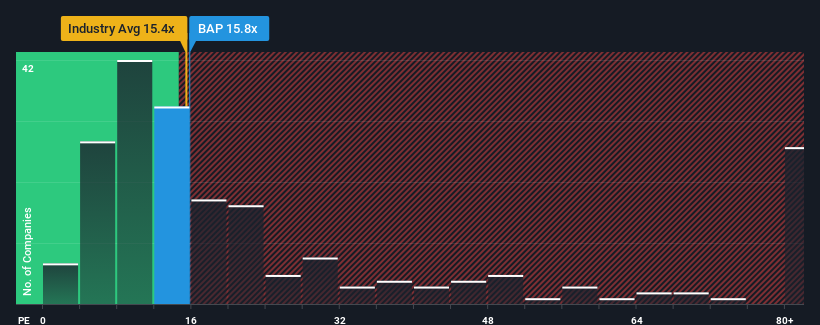- Australia
- /
- Retail Distributors
- /
- ASX:BAP
Take Care Before Jumping Onto Bapcor Limited (ASX:BAP) Even Though It's 26% Cheaper
Bapcor Limited (ASX:BAP) shares have had a horrible month, losing 26% after a relatively good period beforehand. The drop over the last 30 days has capped off a tough year for shareholders, with the share price down 30% in that time.
Although its price has dipped substantially, given about half the companies in Australia have price-to-earnings ratios (or "P/E's") above 20x, you may still consider Bapcor as an attractive investment with its 15.8x P/E ratio. Nonetheless, we'd need to dig a little deeper to determine if there is a rational basis for the reduced P/E.
Recent times haven't been advantageous for Bapcor as its earnings have been falling quicker than most other companies. It seems that many are expecting the dismal earnings performance to persist, which has repressed the P/E. If you still like the company, you'd want its earnings trajectory to turn around before making any decisions. Or at the very least, you'd be hoping the earnings slide doesn't get any worse if your plan is to pick up some stock while it's out of favour.
View our latest analysis for Bapcor

Is There Any Growth For Bapcor?
The only time you'd be truly comfortable seeing a P/E as low as Bapcor's is when the company's growth is on track to lag the market.
If we review the last year of earnings, dishearteningly the company's profits fell to the tune of 20%. The last three years don't look nice either as the company has shrunk EPS by 8.6% in aggregate. So unfortunately, we have to acknowledge that the company has not done a great job of growing earnings over that time.
Shifting to the future, estimates from the ten analysts covering the company suggest earnings should grow by 15% each year over the next three years. That's shaping up to be similar to the 16% each year growth forecast for the broader market.
With this information, we find it odd that Bapcor is trading at a P/E lower than the market. Apparently some shareholders are doubtful of the forecasts and have been accepting lower selling prices.
The Bottom Line On Bapcor's P/E
Bapcor's recently weak share price has pulled its P/E below most other companies. While the price-to-earnings ratio shouldn't be the defining factor in whether you buy a stock or not, it's quite a capable barometer of earnings expectations.
Our examination of Bapcor's analyst forecasts revealed that its market-matching earnings outlook isn't contributing to its P/E as much as we would have predicted. When we see an average earnings outlook with market-like growth, we assume potential risks are what might be placing pressure on the P/E ratio. At least the risk of a price drop looks to be subdued, but investors seem to think future earnings could see some volatility.
And what about other risks? Every company has them, and we've spotted 1 warning sign for Bapcor you should know about.
Of course, you might find a fantastic investment by looking at a few good candidates. So take a peek at this free list of companies with a strong growth track record, trading on a low P/E.
Valuation is complex, but we're here to simplify it.
Discover if Bapcor might be undervalued or overvalued with our detailed analysis, featuring fair value estimates, potential risks, dividends, insider trades, and its financial condition.
Access Free AnalysisHave feedback on this article? Concerned about the content? Get in touch with us directly. Alternatively, email editorial-team (at) simplywallst.com.
This article by Simply Wall St is general in nature. We provide commentary based on historical data and analyst forecasts only using an unbiased methodology and our articles are not intended to be financial advice. It does not constitute a recommendation to buy or sell any stock, and does not take account of your objectives, or your financial situation. We aim to bring you long-term focused analysis driven by fundamental data. Note that our analysis may not factor in the latest price-sensitive company announcements or qualitative material. Simply Wall St has no position in any stocks mentioned.
About ASX:BAP
Bapcor
Supplies vehicle parts, accessories, automotive equipment, and services and solutions in Australia, New Zealand, and Thailand.
Average dividend payer and fair value.
Similar Companies
Market Insights
Community Narratives




